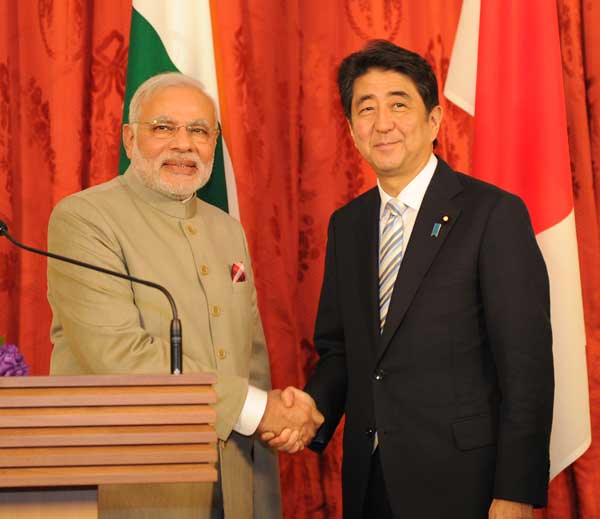 US President Donald Trump’s lukewarm approach to Japan has compelled Tokyo to explore the possibility of improving ties with Beijing. In recent months there seems to be a desire on both sides to work jointly on several important issues, strategic and economic, like North Korea and the impact of Trump’s tariffs on both economies.
US President Donald Trump’s lukewarm approach to Japan has compelled Tokyo to explore the possibility of improving ties with Beijing. In recent months there seems to be a desire on both sides to work jointly on several important issues, strategic and economic, like North Korea and the impact of Trump’s tariffs on both economies.
During Chinese Foreign Minister Wang Yi’s recent visit to Japan (the first visit by a Chinese foreign minister to Japan in nine years) both countries spoke of the need to work jointly on the North Korea issue. The China-Japan Economic Dialogue was held, with both discussing the issue of US tariffs and the need to work jointly to strengthen globalization, from which both have benefited.
Particularly important were discussions on the possibility of cooperating in infrastructure projects in third countries. Wang invited Japan to consider participating in the One Belt One Road Initiative (OBOR), also called the Belt and Road Initiative (BRI). Japanese Foreign Minister Taro Kono said his country was open to participating in parts of the project which were in sync with international standards.
Japanese Prime Minister Shinzo Abe, addressing Japanese and Chinese executives in Tokyo recently, had also alluded to the possibility of Japanese participation in the BRI, saying, “I believe Japan will be able to cooperate well with China, which has been putting forward its One Belt One Road initiative.”
Significantly, Japan has not opposed the China Pakistan Economic Corridor (CPEC), which is the main bone of contention between China and India, Japan’s close partner.
Speaking at the Institute of Strategic Studies Islamabad in November 2017, Japanese Ambassador Takashi Kurai said, “We are not against CPEC but, at the same time, we believe whatever project is carried out should be based on transparency, openness, accountability. We have made it clear that we may be open to help in furthering this project.”
Japan’s attitude toward the BRI is interesting because it has also offered an alternative proposal, the Partnership for Quality Infrastructure (PQI), where India and Japan are working together. Both countries are working on ambitious projects like the Asia Africa Growth Corridor.
Under the framework of its ‘Indo-Pacific Strategy,’ Japan is seeking to work with other member countries of the Quadrilateral (US, India, Australia) on important infrastructural projects.
Japan’s attitude towards the BRI has important lessons for India, that it should be more open towards China’s Belt and Road Initiative.
Over the past few months, some important steps have been taken to bring the Sino-Indian relationship back on track, the most significant being Indian Prime Minister Narendra Modi’s visit to China to meet Chinese President Xi Jinping (April 27-28). They discussed a number of key geo-political as well as economic issues.
Both leaders spoke about the possibility of collaborating on a joint project in Afghanistan. However, it is unlikely that differences over the BRI project will be resolved easily, though some incremental progress could be made.
India’s key objection to the BRI is the CPEC project, which will pass through disputed territory (Gilgit and Baltistan), which India claims as its own and therefore impinging on its sovereignty. New Delhi has repeatedly voiced its opposition to the issue while Beijing has said it was willing to address India’s concerns.
Xi, at the Boao Forum, had said China was willing to address apprehensions of other countries on BRI, and that it was not targeted towards anyone.
At the 5th Sino-Indian Strategic and Economic Dialogue in Beijing, China did not convincingly allay Indian concerns, so India refused to sign or support a communique supporting the BRI, released after a meeting of Shanghai Cooperation Organization (SCO) group’s foreign ministers in Beijing on April 24.
At the end of Modi and Xi’s two day informal summit, Chinese Vice Foreign Minister, Kong Xuanyou said China would not push India to accept the term ‘One Belt One Road’, saying it was not important. He said the leaders shared a clear convergence in their vision for improved inter-connectivity.
After tensions with China and differences over CPEC, India has also been lukewarm over the Bangladesh, China, India and Myanmar (BCIM) Corridor, discussions on which have been on for nearly two decades. With China’s insistence that BCIM is a part of BRI, India has cooled to the BCIM.
New Delhi should not be totally closed to this project, as it would benefit India, especially eastern India, and complement India’s ‘Act East Policy’. Beijing has been reaching out to West Bengal (Kunming and Kolkata have sister-city status), and had invited West Bengal Chief Minister Mamata Bannerjee to visit China in 2017. Beijing has begun to show more interest in eastern India with a key factor being the BCIM project.
India, which has sought to rework ties with China, would do well to not remain totally closed to the BRI. In recent months, imagination has been shown in reaching out to China. India should exhibit a degree of pragmatism about the BRI and take all domestic stakeholders on board. The Indo-Pacific region is witnessing significant changes and rigidity serves no one’s purpose.
Courtesy: http://southasiamonitor.org/news/india-like-japan-should-be-more-flexible-on-bri/sl/27114




